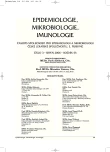-
Medical journals
- Career
Seroprevalence of Antibodies Against Hepatitis A Virus and Hepatitis B Virus in Nonvaccinated Adult Population over 40 Years of Age
Authors: R. Chlíbek 1; B. Čečetková 2; J. Smetana 1; R. Prymula 1; I. Kohl 3
Authors‘ workplace: Fakulta vojenského zdravotnictví UO, Hradec Králové 1; Thomayerova Fakultní nemocnice Praha 2; GlaxoSmithKline, Praha 3
Published in: Epidemiol. Mikrobiol. Imunol. 55, 2006, č. 3, s. 99-104
Overview
Study objective:
To determine prevalence rates of antibodies against hepatitis A virus (HAV) and hepatitis B virus (HBV) in the general adult male and female population over 40 years of age with no history of viral hepatitis A (VHA) and viral hepatitis B (VHB) who have never been vaccinated against hepatitis and to assess the cost-effectiveness of the pre-vaccination serological screening.Material and methods:
In 2003–2004, a total of 972 persons of three age categories: 41–50 years, 51–60 years, 61 and more years, were screened. Persons with a history of VHA and/or VHB and those who had been vaccinated against hepatitis were not included in the study. The following four indicators were determined from a 5 ml specimen of whole venous blood by electrochemiluminiscence assay: total anti–HAV antibodies, total anti-HBc antibodies, anti-HBs antibodies and HBsAg, as the most suitable markers of experienced hepatitis or previous vaccination.Results:
The prevalence rates of anti-HAV antibodies were lower in females compared to males for all of the three age categories. These antibodies were detected in 16.8 %, 52.9 % and 77.5 % of 41–50 - year-olds, 51–60-year-olds and ≥ 61-year-olds, respectively. The total prevalence rate for the three age groups was 61.6 %. The anti-HBc antibody seroprevalence rates were 1.9 %, 5.3 % and 6.1 %, respectively.Conclusion:
The results show high prevalence of VHA in higher age groups. Such a high seroprevalence of antibodies in nonvaccinated persons with no history of viral hepatitis is suggestive of a very frequent incidence of asymptomatic infection. For this reason, the prevaccination screening of anti-HAV antibodies is cost-effective in the population over 50 years of age but is not justified in persons under 40 years of age. Prevaccination screening for anti-HBc antibodies appears not to be cost-effective regardless of age in view of their low prevalence in the Czech population.Key words:
seroprevalence – viral hepatitis A – viral hepatitis B – antibodies.
Labels
Hygiene and epidemiology Medical virology Clinical microbiology
Article was published inEpidemiology, Microbiology, Immunology

2006 Issue 3-
All articles in this issue
- Phage Types and Virulence Markers of Clinical Isolates of Salmonella Enteritidis
- Aeromonas spp. as the Causative Agent of Acute Diarrhoea in Children under 1 Year of Age
- Seroprevalence of Antibodies Against Hepatitis A Virus and Hepatitis B Virus in Nonvaccinated Adult Population over 40 Years of Age
- Molecular Detection and Subtyping of Treponema pallidum subsp. pallidum in Clinical Specimens
- Head Louse: Taxonomy, Incidence, Resistance, Delousing
- Epidemiology, Microbiology, Immunology
- Journal archive
- Current issue
- Online only
- About the journal
Most read in this issue- Aeromonas spp. as the Causative Agent of Acute Diarrhoea in Children under 1 Year of Age
- Head Louse: Taxonomy, Incidence, Resistance, Delousing
- Seroprevalence of Antibodies Against Hepatitis A Virus and Hepatitis B Virus in Nonvaccinated Adult Population over 40 Years of Age
- Molecular Detection and Subtyping of Treponema pallidum subsp. pallidum in Clinical Specimens
Login#ADS_BOTTOM_SCRIPTS#Forgotten passwordEnter the email address that you registered with. We will send you instructions on how to set a new password.
- Career

